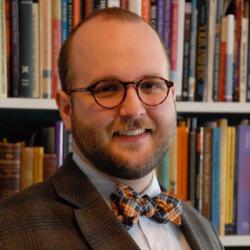Lately, I’ve been watching All Creatures Great and Small, the television adaption of James Herriot’s best-selling books. Alongside the beautiful vistas of the gorgeous Yorkshire Dales, the viewer also catches a glimpse of a difficult but rewarding vocation: veterinary practice in a (then) highly agricultural community.
Herriot and his colleagues (the Farnon brothers) experience tragedies and triumphs in their work. While there are many heartwarming stories of cures and recoveries, we also see livelihoods devastated by injured livestock and herds wiped out from disease.
The difficulty of being a veterinarian in early-to-mid-20th century Yorkshire is apparent. Not only must Herriot receive an education and become certified. He also works at all hours of the day, seven days a week. Dates and special occasions are interrupted by pressing emergency cases. Calves must be delivered in the middle of the night. Fearsome swine must be wrangled for their immunizations. Many procedures, particularly on livestock, require tremendous physical strength and exertion. Payment must be collected from skinflint customers. Rudeness must generally be answered with courteousness. Not only must Herriot and the Farnons “know their stuff,” they must also be diligent and polite. In short, they must be consummate professionals.
It is often remarked that Herriot’s books (and their adaptions) have a lot of parallels with my sphere of ordained ministry, particularly in country parishes. This reinforces the point about Herriot and his colleagues being professionals. In the medieval and early modern era, there were typically three “learned professions”: law, medicine, and divinity. Whether we wish to categorize veterinary practice as a newer, modern profession (joining several others), we can see that Herriot and the Farnon brothers participate in a grand vocational tradition, as well as several important parallels with the professions of today.
First, there are many hoops to jump through, all before entering a line of work that can involve long hours, risk, and difficult personal interactions. Learned professionals receive rigorous training and are then granted licenses—things that not all people have the gifts, talents, and means to secure. Those hoops exist because of another commonality: communal importance.
Typically speaking, every town, village, and hamlet needs an attorney, a doctor, and a pastor. Common life, spiritual and material well-being, crises, and mortality typically involve the classic professions. Today, specialization and other developments have certainly changed these dynamics in drastic ways. But it doesn’t take too much imagination to see how these roles became respected, and why those that fulfill them sought and seek to uphold the dignity of their offices in particular ways.
This still doesn’t tell us why people pursue such vocations in the first place, which is where All Creatures Great and Small is so revealing. Herriot, the Farnon brothers, and others find joy in the work itself and in helping their neighbors. As image-bearers of God, they are moved by compassion in aiding those in need as well as tending and cultivating the created world. Whereas one moment Herriot will complain about trudging about when everyone is tucked comfortably in their beds for the night, at another he can’t believe he gets paid to drive through the beautiful countryside, enjoying the crisp early-morning air. Although he wracks his brain over puzzling cases, he exalts over solving and treating them. Even though he must put down beloved animals, he also saves many, to the clear gratitude of the owners. In his profession, Herriot becomes acquainted with great suffering: abused animals, unhappy domestic lives, the hard-scrabble struggle of farming and husbandry. But, for all of the tribulations, he finds just as many or more consolations: great love among families, sacrificial generosity, mastery of old crafts, warm fellowship, new life, reconciliation.
The life of country vets is hard, stressful work, and it involves a great deal of sacrifice— but it is good, fruitful, and meaningful. In fulfilling such a vocation, they cooperate with nature and help uphold to their community. They love their neighbors by treating their animals, particularly the livestock upon which their livelihood depends.
May the rest of us be inspired to find similar meaning in the work of our own hands.
Image: Visit to the Vet, Eduard Pistorius, 1850 (Public Domain)

